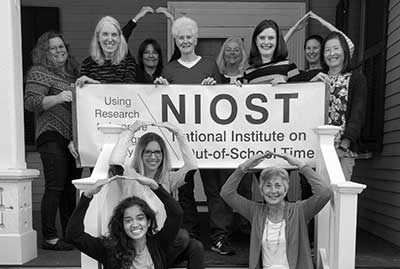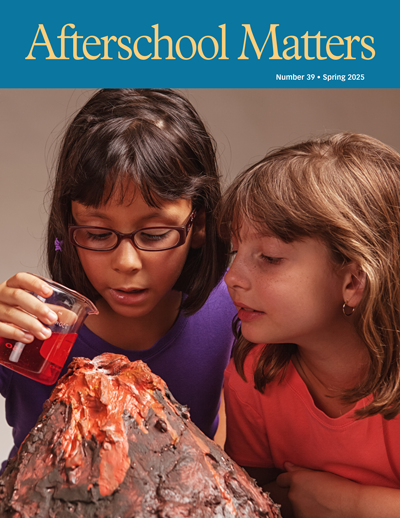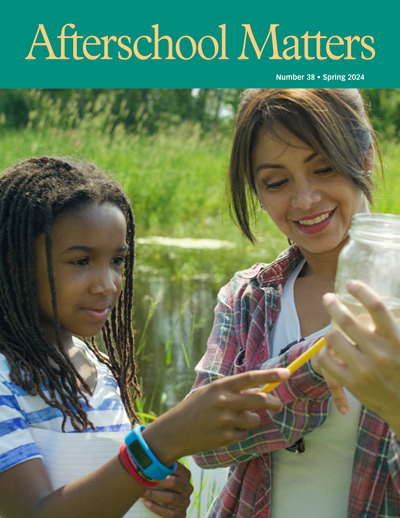 By Georgia Hall
By Georgia Hall
At the beginning of September, NIOST welcomed a new group of 16 Afterschool Matters Fellows to our campus for a two-day retreat filled with reflection, thoughtful writing, and inquiry-focused discussion. A sentence one of the fellows wrote has stuck with me: “Relevant OST programming never loses sight of its role as an entity where youth and their families are connected to the best promises of a civil and caring society.” Yes, OST practitioners and researchers want to see ourselves as relevant! We value our role as caretakers of children and youth, but we also strive for relevance as we support healthy development, social and emotional wellness, and academic achievement. These aspirations are our contribution to a civil and caring society.
Continue Reading
Supporting Stability While Creating Structural Change
By Alexandra E. Pavlakis
More than one million U.S. students experience homelessness (National Center for Homeless Education, 2019). Although homelessness affects all racial groups, young people experiencing homelessness disproportionately identify as Black or Latinx (Hallett & Skrla, 2017).
Continue Reading
Blending Minecraft, Leadership, and Creativity
By Kristin H. Javorsky
Two third-grade boys sit hunched over a shared tablet, animatedly discussing how to start a structure they are building in the virtual Minecraft world on their screen. To decide whether to use wood, stone, or brick, they are placing a few blocks of each type on a field of green grass to compare the materials visually. An afterschool teacher who has stopped to listen praises them for using one of the leadership habits the class has been discussing, “Begin with the end in mind.” Nearby, two other third graders are taking turns using their tablet to place a sidewalk and light fixtures outside a multistory building in the same virtual world. The teacher observes as the girls deliberately balance the fixtures evenly along the sidewalk. Proudly, they tell her that they are remembering to “Synergize,” using another of the leadership habits the class has discussed.
Continue Reading
By Patricia McGuiness-Carmichael
Relationships with staff are crucial to participants’ growth in youth development programs. These programs help young people develop social and emotional competencies including relationship building, defined as “the ability to establish and maintain healthy and rewarding relationships with diverse individuals and groups” (Collaborative for Academic, Social, and Emotional Learning, 2017). In my work in afterschool programs, I experience firsthand how lasting relationships between staff and the youth and families they serve are central to the work. Staff become a touchpoint and a steady presence: connecting youth to opportunities, listening to them, and supporting them simply by being there.
Continue Reading
Outdoor STEM Education in OST Settings
By Christine Andrews Paulsen and Jessica Rueter Andrews
Addressing the myriad developmental and academic needs of young children is no “walk in the park.” But what if it could be? Too many of today’s children spend too much time indoors, often interacting with screens. They don’t get enough physical exercise. Their learning about nature comes from books and teachers rather than from firsthand exploration of natural phenomena. These issues affect most modern American children, but they are particularly prominent among lowincome children in high-need neighborhoods. Walks (and other activities) in the park, if properly designed, could go a long way toward improving children’s health and developing their cognitive skills.
Continue Reading
Voices from the Field
Creating an Arts-Based Afterschool Program in Rural Maine
By Valerie Zapolsky
I’m hoping that people in some other small town that is poor in financial resources but rich in talent and heart will read our story and be inspired to develop their own afterschool program. Rangeley Friends of the Arts (RFA) is a nonprofit arts organization in Rangeley, a town of 1,200 souls in the rural western mountains of Maine. Working with existing facilities and a largely volunteer workforce, we have established Creative After School Arts, or CASA—a program that provides a safe home away from home and enriching programming to local students five days a week. Our example shows that communities can build arts programming for youth with few resources, as long as they have the will.
Continue Reading
Voices from the Field
Learning Through Play in Harry Potter’s World
By Leigh Anne Wilson & Brittany R. Jacobs
In 1997, the world was introduced to one of its great stories: Harry Potter. The masterful writing of J. K. Rowling, about “the boy who lived,” has struck chords with millions of adults and children. Like many before her, Rowling tapped into the power of storytelling as a means of teaching, inspiring, and passing information from one generation to the next. Anthropologists have found evidence of storytelling throughout history, from orators in huntergatherer tribes to modern writers and actors (Hsu, 2008).
Continue Reading
 By Georgia Hall
By Georgia Hall


